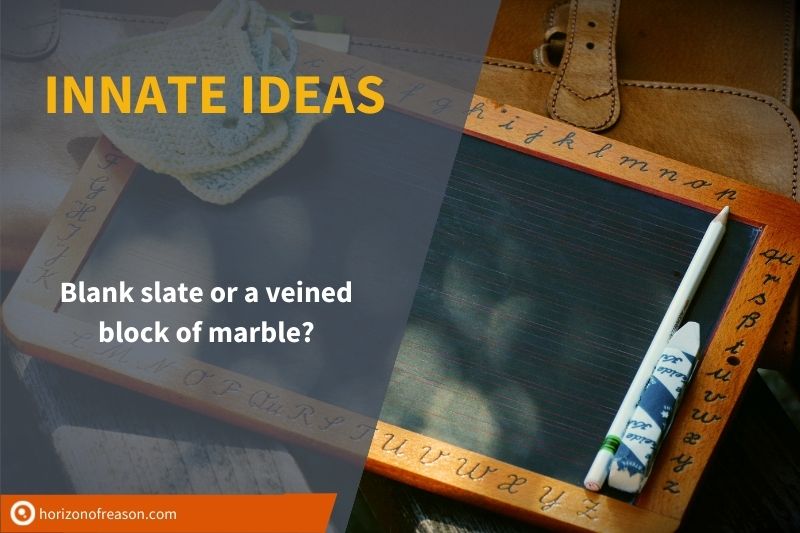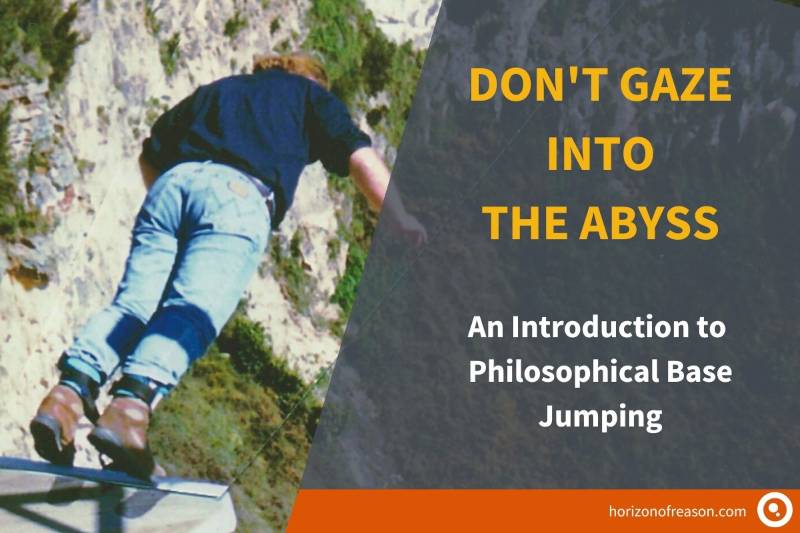
Innate Ideas: Blank Slate or a Veined Block of Marble?

Peter Prevos |
1374 words | 7 minutes
Share this content
We all share certain assumptions about the nature of the physical world. We assume, for example, that objects exist, even when they disappear from view and that something can not ‘be’ and ‘not be’ at the same time. Empiricist philosophers, such as John Locke, argue that we obtain this knowledge gradually through the use of the senses and our general learning ability. Rationalist philosophers, such as Gottfried Wilhelm Leibniz, on the other hand, argue that knowledge, of at least some core principles, is imprinted in our minds, they are innate ideas.
Leibniz argues against the empiricist point of view of Locke in his New Essays on Human Understanding. In this book, Leibniz defends the notion of innate knowledge against Locke’s empiricism in a fictitious dialogue. In this paper briefly discusses the discourse between Leibniz and Locke about the existence of innate knowledge. This paper argues that Locke is unable to show that the concept of innate knowledge is incoherent, but that does not imply that we possess knowledge of innate truths, as argued by Leibniz.
Blank slate or veined block of marble?
Sculptors often claim that the statue to be chiselled from a block of marble is already present inside the uncorked stone. The natural occurring veins and fissures in the rock make it predispositioned towards a particular shape. The sculptor doesn’t create a statue but releases it from the block. Leibniz uses this anecdote as a metaphor to illustrate how the mind is predispositioned towards innate knowledge. Ideas are innate inside us as “inclinations, dispositions, tendencies or natural potentialities and not as actualities”.
Locke, on the other hand, argues in An Essay Concerning Human Understanding that we can “attain to all the knowledge [men] have, without the help of any innate impressions”. He compares the mind of an infant to a tabula rasa, a blank slate. We are, according to this view, born without any knowledge and acquire everything we come to know through experience only.
Some rationalist philosophers argue for the existence of innate knowledge by stating that there are undoubtedly speculative and practical principles which are universally agreed across humanity. Everybody is, for example, supposed to know that an object can not ‘exist’ and ‘not exist’ at the same time. Locke disagrees with the “argument from universal consent” and writes that if there were any universally agreed principles, it would not prove that these are innate unless there is no other way to explain them. Leibniz does, however, not think that these universal assented principles are by definition innate: “… a principle’s being rather generally accepted among men is a sign, not a demonstration, that it is innate”.
Locke also disputes that necessary knowledge is universally assented to: “there are a great part of mankind to whom [these principles] are not so much as known”. Locke believes that the idea of innate knowledge is incoherent. For something to be in the mind, it must be present to consciousness, that is what it means to say that something is in the mind. But then if there are innate beliefs, they will be universally recognised conscious beliefs. Leibniz argues this view is itself confused. According to Leibniz, Locke must be thinking of beliefs as a species of thought, that is conscious occurrences, but beliefs are rarely like that. Beliefs are dispositions rather than events. Leibniz mentions memories, which we can have without present conscious awareness, and he mentions how beliefs may be implicit in the way we reason, like unstated premises in an argument. The fact that not all necessary truths are assented to universally does not prove that they are not innate, for: “even if they were not known, they would still be innate because they are accepted as soon as they are heard”. Innate knowledge is thus subconsciously present in our minds, and we recognise them immediately as eternal truths. Just like it requires labour to release a statue from the block of marble, it requires introspection to unlock the hidden universal knowledge from our subconscious minds.
Leibniz argues for the existence of subconscious knowledge by stating that we often use maxims that are not consciously known—for example, when using enthymemes, arguments with hidden premises. Locke rejects the idea that knowledge can be innate but not directly known to us. He thinks that for necessary knowledge to exist, it must be universally assented to. He denies that we can appeal to a principle we do not have explicitly in mind: “No proposition can be said to be in the mind which it never yet knew, which it was never yet conscious of”. Locke’s main argument against innate knowledge is that it is a contradiction to say that truths are imprinted in the soul which it perceives or understands not, we can not ‘know and know [innate truths] not at the same time’.
Locke’s argument fails because it is generally accepted that we do possess subconscious knowledge. Noam Chomsky shows that we know the rules of grammar of our native language, without actually being able to explain why something is structured the way it is.
Leibniz objects to Locke’s assertion that everything that is known can be derived from the senses, but he accepts the use of the senses to acquire knowledge. Leibniz distinguishes between necessary truths (truths of reason) and contingent truths (truths of facts). We learn about contingent, truths through experience. Still, we can not learn necessary truths this way because we are not able to perceive ad infinitum to determine whether something is a contingent or a necessary truth. This argument turns on the supposed weakness of inductive reasoning, which has been discussed in detail by David Hume. We can only learn about necessary truths through introspection: “the mind is capable not merely of knowing [innate truths], but also of finding them within itself”.
Do we possess innate ideas at birth
Locke is unable to show that the concept of innate knowledge is incoherent. The difference between implicit and explicit knowledge that Leibniz puts forward neutralises Locke’s objection that the idea of innate knowledge is a contradiction. Leibniz has won the discussion, but does that imply that innate knowledge actually exists?
Philosophy has shown that innate ideas are a logical possibility but has not been able to prove its existence beyond doubt. Biology is in favour of Leibniz; The migratory behaviour of many species of fish and birds can only be explained in terms of innate knowledge. Psychological research on how human infants acquire knowledge of the principles governing the physical world is in favour of Locke’s view. Knowledge of these principles is gained gradually in the first months of existence. It increases dramatically as soon as infants can crawl and actively explore their environment in detail. Although psychology has not settled the question of the origin of knowledge of the core principles, it shows that such knowledge is manifested in patters of infants’ exploratory behaviour. It seems that we are stuck and not able to prove the existence of innate knowledge, as we are not able to determine the content of an infant’s unconscious or conscious mind, as Locke also points out.
Even if we possess innate knowledge, or dispositions to obtain knowledge from within our selves, it will not imply that this provides us with necessary truths. The many examples of sensory illusions show that the dispositions of our mind do not always produce correct knowledge. Also, Russell’s paradox shows that purely rational systems of thinking can lead to inconsistencies and do as such, not produce necessary knowledge. John Mackie argues that it does not matter whether innate knowledge exists. We can not rely on it by itself as we can not know it to be true without external verification. The innateness hypothesis becomes, from this pragmatic point of view, redundant.
References
- Chomsky, Noam, Cartesian linguistics: A chapter in the history of rationalist thought (1966).
- Gray, Peter, Psychology, 4th edition. (New York: Worth Publishers, 2002).
- Leibniz, G.W., New essays of human understanding, (Cambridge University Press, 1981), Translated by Peter Remnant and Jonathan Bennett.
- Locke, John, An essay concerning human understanding, (Chinese University of Hong Kong, 1994).
- Mackie, John, Problems from Locke, (Oxford: Clarendon Press, 1976).
- Townsend, Aubrey, editor, Origins of modern philosophy B, (Melbourne: Monash University, 1998).
Share this content


